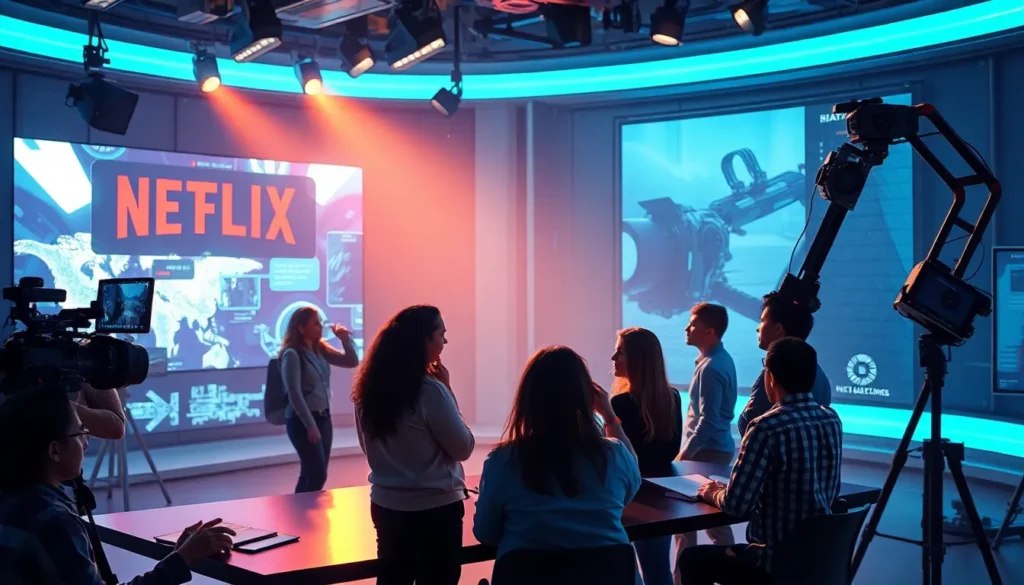Table of Contents
ToggleImagine a world where Netflix not only serves up your favorite binge-worthy shows but also crafts entire films using artificial intelligence. Sounds like something out of a sci-fi flick, right? Well, welcome to the future! As technology evolves, so does storytelling, and Netflix is at the forefront of this cinematic revolution.
Overview of Netflix Artificial Intelligence Movies
Netflix utilizes artificial intelligence to revolutionize its movie productions. The platform leverages data analytics to understand viewer preferences, enabling creators to shape compelling narratives. AI algorithms analyze trends and patterns, informing decisions on genres, themes, and character development.
Several films exemplify this innovation, showcasing how technology enhances storytelling. For instance, “Good Happy” applies machine learning to generate dialogue that resonates with audiences. “The Irishman” benefits from advanced visual effects, allowing characters to appear younger; this reflects a growing trend in AI-driven filmmaking.
Moreover, Netflix’s AI extends to personalized recommendations, shaping viewers’ experiences. It curates content based on individual tastes, boosting engagement metrics significantly. Data-driven insights also assist in optimizing marketing strategies for movie promotion.
AI’s impact on Netflix movies goes beyond production; it influences distribution as well. Algorithms determine the best release strategies, maximizing audience reach. Experimentation with different formats, such as interactive storytelling in “Black Mirror: Bandersnatch,” highlights the platform’s commitment to innovation.
Overall, Netflix stands at the forefront of the intersection between filmmaking and artificial intelligence. Creative teams collaborate with data scientists, merging artistry with technology. This pioneering approach not only enhances viewer experiences but also sets new standards for the film industry. The continual integration of AI positions Netflix as a leader in evolving cinematic narratives.
Popular Titles Featuring Artificial Intelligence

Numerous films on Netflix explore the theme of artificial intelligence, showcasing how technology reshapes storytelling. Audience engagement increases with these innovative narratives.
Movie 1: “Good Happy”
“Good Happy” exemplifies the application of machine learning in film. This title features a unique approach to dialogue generation, enabling characters to interact with relatable and dynamic speech. The algorithms analyze viewers’ preferences, creating engaging exchanges in real-time. The result is an immersive experience that resonates with audiences. Through this process, creators hone in on emotional depth, ensuring the storytelling remains relevant and authentic.
Movie 2: “The Irishman”
“The Irishman” uniquely utilizes advanced visual effects to age and de-age characters. This film, directed by Martin Scorsese, demonstrates AI’s potential in enhancing visual narratives. Viewers witness iconic figures portrayed by actors decades younger, blurring the lines of time within storytelling. The innovative use of digital technology allows for a fresh perspective on historical narratives. As a result, audiences engage more deeply with the characters’ journeys, elevating the film’s overall impact.
The Role of AI in Filmmaking
AI transforms various aspects of filmmaking, enhancing creativity and efficiency in the industry. Its integration with production processes allows filmmakers to explore new narrative possibilities.
Scriptwriting and Story Development
AI tools assist writers by analyzing successful story structures and identifying key themes. They generate outlines or suggest plot twists based on audience preferences and historical data. Machine learning algorithms can also evaluate scripts for pacing and character development, ensuring they align with viewer expectations. By utilizing these insights, creators enhance storytelling, crafting engaging narratives that resonate with audiences. The film “Good Happy” exemplifies this approach, where AI supports dynamic dialogue generation, making character interactions more relatable.
Visual Effects and Animation
AI significantly improves visual effects and animation within productions. Advanced algorithms help create realistic age manipulations, as seen in “The Irishman,” allowing characters to seamlessly transition across different time periods. Additionally, AI streamlines the animation process, optimizing frame rendering and reducing production time. By automating intricate tasks, filmmakers can focus on creativity and storytelling. As a result, audiences experience visually stunning narratives that captivate their attention and enhance overall engagement.
Audience Reception of AI Films on Netflix
Audience reception of artificial intelligence films on Netflix varies significantly, with viewers generally expressing intrigue and excitement. Many appreciate how these films explore complex themes related to technology and human experience. “Good Happy” garnered positive feedback for its innovative approach to dialogue generation, engaging the audience with relatable interactions.
Critics frequently highlight the depth of narratives embedded in AI-driven films. The storytelling techniques used in “The Irishman” showcase how visual technology can present characters in a new light, allowing audiences to connect with historical figures more intimately. User ratings on platforms often reflect a fondness for such inventive storytelling.
Data analytics play a crucial role in understanding audience preferences, enhancing viewer satisfaction. Netflix employs algorithms to gauge viewer reactions, tailoring future content to align with established interests. For example, films that integrate compelling AI themes often receive higher viewership numbers, demonstrating a growing trend.
Discussions on social media amplify the reception of these films. Fans actively share their thoughts and analyses, sparking conversations that keep audiences engaged. Online threads frequently reveal how audiences feel a sense of connection with the characters, especially when AI technology is used to bridge emotional gaps in storytelling.
Additionally, the unique blend of technology and creativity resonates strongly with younger demographics. Younger viewers particularly favor films that challenge traditional narratives, advocating for the exploration of AI’s implications on society. Overall, the reception indicates a promising future for AI films on the platform, suggesting that these innovative productions may shape entertainment in the years to come.
Future Trends in Netflix Artificial Intelligence Movies
Emerging trends indicate significant advancements in Netflix’s use of artificial intelligence in film. AI algorithms now analyze vast datasets to uncover viewer preferences, facilitating tailored content that resonates deeply with audiences. With these insights, creators can craft narratives that align with emerging themes and genres.
Utilization of machine learning expands further as Netflix explores personalized storytelling. This approach enhances viewer engagement by adapting storylines based on individual interests. For example, characters in AI-driven narratives may evolve differently based on real-time audience feedback.
AI’s role in production is becoming more pronounced. Streamlined editing processes and automated visual effects reduce completion times for films. Filmmakers benefit from more time to focus on storytelling and character arcs, resulting in richer, more immersive experiences.
Future films may showcase even more complex interactions between AI and human creators. Collaborative platforms could emerge where human writers partner with AI tools to brainstorm unique concepts and plot developments. This fusion enhances creativity while maintaining a human touch in storytelling.
Anticipating viewer reactions remains a priority. Netflix’s robust data analytics continually monitor engagement patterns, allowing for adjustments in promotional strategies and release schedules. Engaging directly with audiences can generate organic buzz, keeping films relevant long after their premiere.
As technology evolves, so does the thematic exploration within Netflix films. Future productions might delve deeper into ethical considerations surrounding AI, challenging audiences to reflect on technology’s impact on society. Such narratives could spark essential conversations about the balance between innovation and responsibility.
The future of filmmaking is undeniably intertwined with artificial intelligence, as evidenced by Netflix’s pioneering efforts. By leveraging AI technologies, the platform is redefining storytelling and enhancing audience engagement. This innovative approach not only streamlines production but also enriches narratives, allowing for deeper connections between characters and viewers.
As Netflix continues to explore the potential of AI, it paves the way for a new era of cinema that challenges traditional boundaries. The captivating blend of technology and creativity is set to resonate with audiences for years to come, prompting discussions about the ethical implications of such advancements. With each new release, Netflix showcases the transformative power of AI, making it an exciting time for both filmmakers and fans alike.





